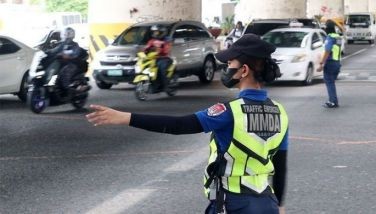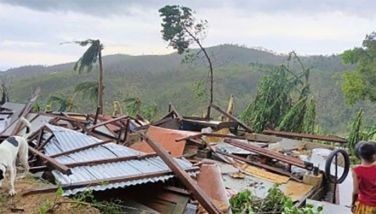Makati asks nat'l gov't for help amid flooding in major roads
MANILA, Philippines - The Makati City government on Friday called on the national government to double the anti-flooding efforts on national roads within the city’s jurisdiction following the flooding on Gil Puyat Avenue (Buendia) and Osmena Boulevard last Thursday night brought by the sudden downpour.
Citing Osmeña and Buendia as national roads, Makati Mayor Jejomar Erwin Binay said the national government is in charge of the maintenance and declogging of these roads, not Makati.
“The city government is in charge of secondary roads, but even if we do regular declogging, Makati is affected if national roads are flooded. Yesterday’s floods affected Makati residents and businesses. And it’s only the start of the rainy season,†Binay said.
“Makati will be at the mercy of the elements if the national government agencies do not act immediately,†he added.
Last April, the city’s Department of Engineering and Public Works (DEPW) had completed the repair and improvement of the drainage system, including the installation of new concrete pipes in the barangays, particularly those that are low-lying and prone to floods.
In its report to the mayor, the DEPW had completed its drainage improvement, concreting and concrete reblocking works in 16 barangays in both districts. It had also completed improvement and dredging of a portion of Makati Diversion Channel spanning the barangays of San Lorenzo, Bel-Air and San Antonio.
For the first five months of the year, the DEPW had collected over 14,000 cubic meters of silt and waste matters during its desilting and declogging operations.
In 2013, the DEPW improved a total of 631.94 kilometers of drainage in 1,127 streets. Improvement of the remaining open canal in 33 streets in district 2, with a total length of 2.588 kilometers, is scheduled for completion this year.
According to the Makati City government, during heavy rains, streets in Makati’s low-lying barangays would come under 0.30 meter-deep floods and it would take about an hour for the floodwater to recede.
However, it added that with the use of modern equipment and efficient monitoring system, the city government has effectively reduced the average receding time of floods in most low-lying areas to around 10 to 15 minutes.
According to the Metrobase of the Metropolitan Manila Development Authority (MMDA), the strong rain that started on Thursday afternoon and lasted until early evening triggered flooding in some parts of Metro Manila as well as crippled vehicular traffic along EDSA and the C5 Road.
According to the Flood Control Information Center (FCIC) of the Metropolitan Manila Development Authority (MMDA), the rain, generated by a localized thunderstorm started pouring at about 3:30 pm.
By 6:35 p.m., only the portion of Osmena Boulevard going to Gil Puyat Avenue in Makati southbound remained flooded with almost 12 inches of rainwater.
At the height of the downpour, the FCIC recorded flooding at Pasong Tamo Extension near the Don Bosco school in Makati at about 21 inches of rainwater.
The FCIC added that the Shaw underpass along EDSA in Mandaluyong City was also flooded at the height of the downpour but subsided after 30 minutes.
Vehicular traffic both southbound and northbound along EDSA and the C5 Road also crawled at a snail's pace.
The Metrobase said the slow moving traffic on EDSA was caused by flooding near the exit ramp of the Skyway near Gil Puyat Avenue.
- Latest
- Trending





























